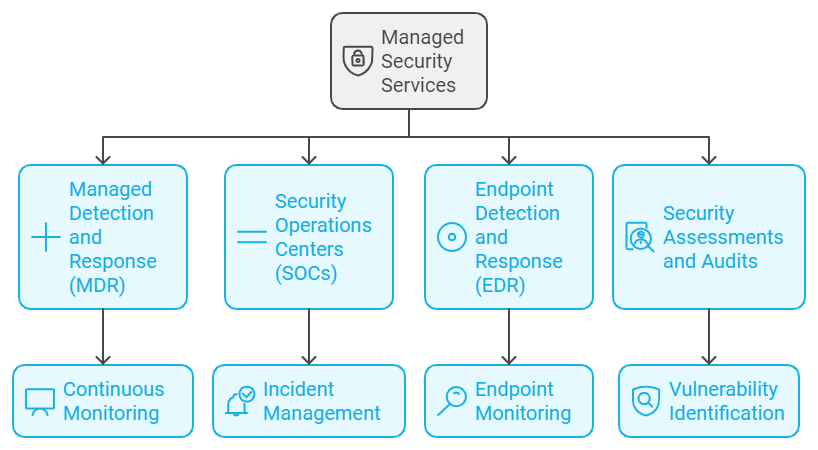In today’s rapidly evolving digital landscape, organizations face an increasing number of sophisticated cyber threats. As a result, many businesses are turning to Managed Security as a Service (MSaaS) to safeguard their data and operations. This service model provides companies with a range of cybersecurity solutions that can be outsourced to a third-party vendor, allowing businesses to focus on their core operations while maintaining robust security defenses.
Table of Contents
What is Managed Security as a Service (MSaaS)?
MSaaS is a holistic approach to cybersecurity that encompasses 24/7 monitoring, threat detection, incident response, and regulatory compliance support. By outsourcing these critical functions to Managed Security Service Providers (MSSPs), businesses can mitigate the risks associated with cyberattacks, data breaches, and operational disruptions.
Read More: Learn more about the role of MSSPs in modern cybersecurity strategies.

Key Types of Managed Security Services:
- Managed Detection and Response (MDR): MDR services provide continuous monitoring and analysis of system alerts, identifying potential security incidents in real time. MDR solutions often leverage Security Information and Event Management (SIEM) tools to detect and mitigate threats before they cause significant damage.
- Read More: How MDR Improves Cybersecurity for Businesses
- Read More: How MDR Improves Cybersecurity for Businesses
- Security Operations Centers (SOCs): A SOC is a centralized hub where security professionals manage and respond to threats. These teams help organizations by providing timely responses to incidents, ensuring quick containment and resolution.
- Endpoint Detection and Response (EDR): EDR services focus on monitoring endpoints, such as employee devices, for suspicious activities. Using advanced behavioral analysis, EDR systems can detect and neutralize potential threats at the endpoint level.
- Security Assessments and Audits: Regular security assessments help identify vulnerabilities in an organization’s systems. MSSPs provide ongoing audits to ensure that security protocols are up to date with evolving threats.

Benefits of Managed Security Services
Outsourcing security management offers numerous advantages for organizations of all sizes. Below are some of the key benefits of leveraging MSSPs:
1. 24/7 Monitoring and Response:
Managed Security Services ensure round-the-clock surveillance, enabling real-time threat detection and rapid incident response. This constant vigilance reduces the risk of undetected cyberattacks.
Read More: Why 24/7 Monitoring is Critical in Today’s Cyber Landscape
2. Access to Expert Knowledge:
MSSPs employ seasoned cybersecurity experts who are well-versed in the latest threat intelligence and mitigation strategies. This allows organizations to benefit from expert knowledge without the need to hire and train an in-house team.
Read More: The Role of Cybersecurity Experts in Managed Services
3. Cost Savings:
Outsourcing cybersecurity to an MSSP can lead to significant cost savings. MSSPs spread the costs of infrastructure and expertise across multiple clients, making advanced security solutions more affordable for businesses.
Read More: How MSSPs Help Reduce Security Management Costs
4. Advanced Threat Intelligence:
With access to the latest threat intelligence, MSSPs can anticipate and neutralize threats before they escalate. This proactive approach ensures better protection against emerging cyber threats.
Read More: Leveraging Threat Intelligence for Proactive Cybersecurity
5. Regulatory Compliance:
MSSPs help businesses navigate complex regulatory landscapes by ensuring compliance with data protection laws, such as GDPR or HIPAA. This reduces the risk of fines and penalties related to non-compliance.
Read More: How MSSPs Ensure Compliance with Global Data Regulations
Common Challenges in Managed Security Services
Despite the advantages, organizations may face several challenges when adopting MSaaS:
1. Planning Challenges:
Creating effective Incident Response (IR) plans can be a daunting task, especially if these plans are outdated or not structured correctly. Without a solid framework, it can be challenging to respond quickly to security incidents.
Read More: Best Practices for Developing an Effective Incident Response Plan
2. Incident Handling:
Relying on external service providers for incident handling introduces complexities. Organizations must ensure that their MSSPs align with their internal priorities, especially during critical security breaches.
Read More: Coordinating Incident Response with MSSPs
Market Trends Driving Growth in Managed Security Services
The market for Managed Security Services is expected to experience substantial growth in the coming years. According to industry reports, the MSS market is projected to reach USD 99 billion by 2032, with a CAGR of 13.5% from 2024 to 2032.
1. Rise of Cybercrime:
With the increasing frequency of cyberattacks, organizations across industries are adopting MSS to safeguard their data and infrastructure. The growing sophistication of cyber threats, including ransomware and phishing attacks, is a significant driver of this growth.
Read More: Top Cybersecurity Threats Facing Organizations in 2024
2. Shift Toward Cloud-Based Security:
As businesses migrate to the cloud, the demand for cloud-based security solutions has risen. MSSPs are now offering scalable cloud security services that cater to the unique needs of cloud environments.
Read More: How Cloud-Based Security Solutions Are Shaping the Future of MSS
3. AI and Machine Learning Innovations:
The integration of Artificial Intelligence (AI) and Machine Learning (ML) into security services has improved the ability of MSSPs to detect and respond to threats in real-time. AI-driven solutions allow for faster identification of anomalies and potential breaches.
Read More: AI-Powered Threat Detection: The Future of Cybersecurity
Conclusion: The Future of Managed Security as a Service
Managed Security as a Service is a vital component of any organization’s cybersecurity strategy. By leveraging MSSPs, businesses can ensure that they remain protected from evolving threats while reducing costs and focusing on their core operations. With advancements in AI, cloud-based solutions, and proactive threat intelligence, the future of MSaaS looks promising for organizations seeking robust, scalable, and cost-effective security solutions.
For more insights into the latest trends in cybersecurity, check out these related articles:
